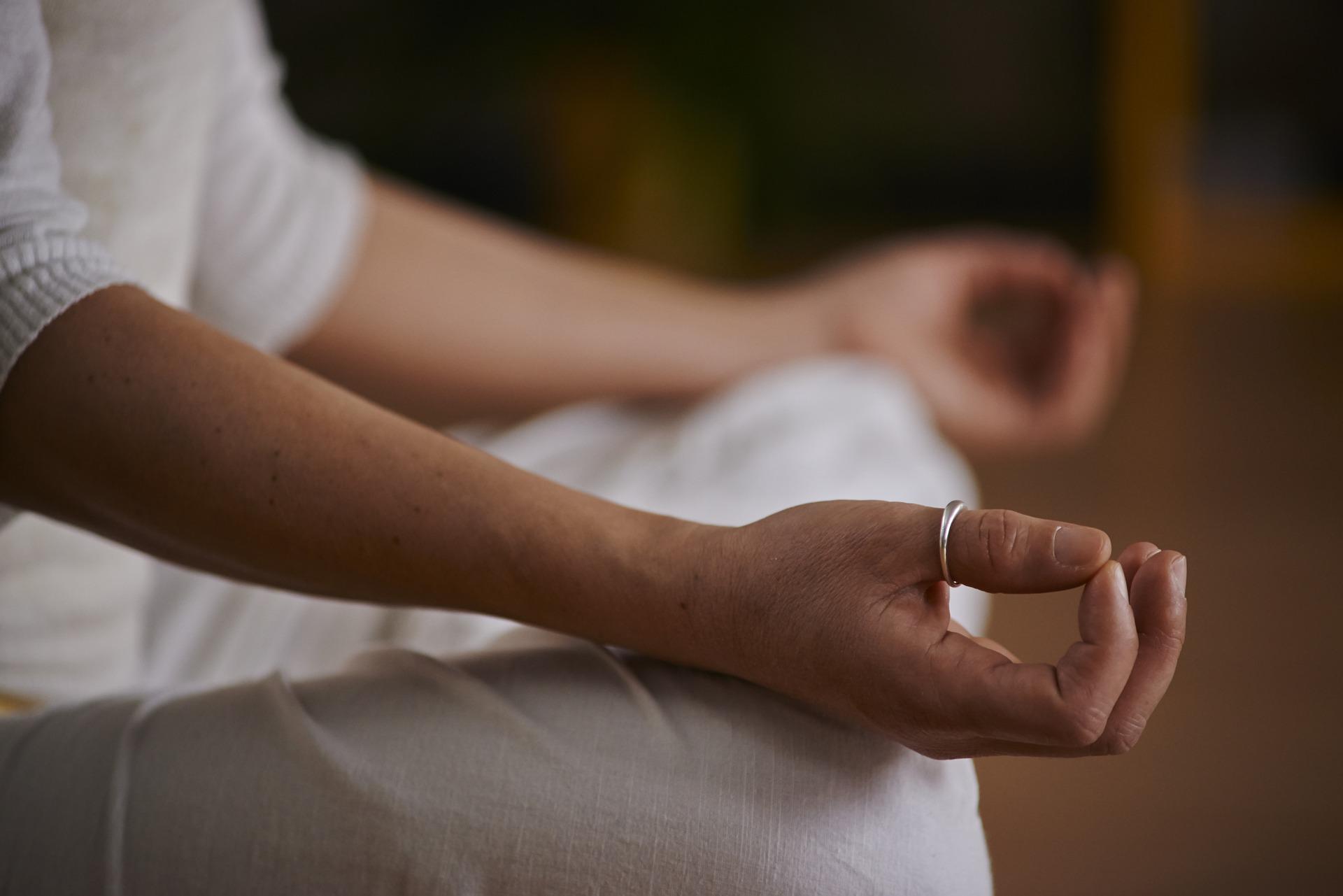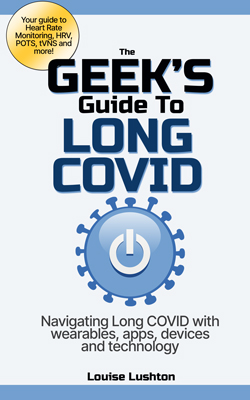If you’ve got Long Covid, it may help if you can calm the nervous system and improve HRV. The autonomic nervous system (ANS) controls your heart rate, blood pressure, digestion, sweating and other unconscious processes. Research suggests that people with Long Covid have a disrupted authonomic nervous system (Barizien, 2021; Marques, 2022) and problems with their vagus nerve – the main nervous that controls the ANS (Acanfora, 2022, Papadopoulou, 2022). This may explain symptoms such as heart rate spikes, orthostatic intolerance, palpitations, shortness of breath, constipation and fatigue.
The ANS has two main modes, sympathetic (fight or flight) and parasympathetic (rest and digest). When the body is under stress, the sympathetic system becomes dominant. Thus, it may be helpful to encourage the ANS into the parasympathetic mode, which may prompt rest, calm and healing. One way to track the ANS is with heart rate variability (HRV) readings. Read more about the ANS and heart rate variability on the HRV page.
Ways to Calm the Nervous System and Improve HRV
Even though the autonomic nervous system is usually beyond our conscious control, there are things we can do to improve the overall function and to prompt the ANS into a more restful and calm state. (Note: there’s a lot of varied research into each of these suggestions. After each I’ve listed a search that will help you dig deeper if you wish).
Advertisement
The Geek’s Guide To Long Covid is available as an ebook!
You’ll find a comprehensive guide to using wearables, apps and technology to cope with Long Covid. It offers detailed instructions on pacing, heart rate monitoring, HRV, POTS, deep breathing, tVNS, air purifiers, CO2 monitors and lots more.
Available from Amazon
- Meditation. Learning to meditate and be mindful reduces overall bodily stress. Meditation encourages your mind and body to relax and let go of tension. (Studies)
- Deep breathing. Even taking three deep breaths can slow down your heart rate and relax your body. Breathing exercises that focus your attention on your breath and induce slow exhalations are especially good for HRV. You can go one step further and do biofeedback breathing where you breathe in a 4-6 pattern (breathe in for 4, out for 6) in time with a visual prompt. In theory, this can “train” your HRV to be higher. (Studies). There’s a list of different breathing techniques and tips on the Deep Breathing Exercises for Long Covid page.
- Getting enough sleep. Ensuring you have enough sleep each night will calm the nervous system and will improve HRV. Looking after sleep hygiene is important – e.g having a regular bedtime, avoiding blue light and screens for two hours before bed, sleeping in a dark, cool room. (Studies)
- Eating well. Embracing fresh, whole foods with lots of vegetables and fibre is always a good way to improve health. It will also help your HRV. Eating regularly at predictable mealtimes is a good idea as well. (Studies)
- Stay hydrated. Drinking enough water will help keep your body free of excess stress.
- Look after your mental and emotional health. Stressful situations activate the sympathetic nervous system, as does ongoing anxiety and negative emotions. Give yourself permission to deal with stress and to look after your mental and emotional wellbeing. Remember that crying activates the parasympathetic nervous system, so it can help.
- Exercise (caution). In healthy people, exercise has been shown to improve HRV, regulate emotion and reduce anxiety and depression (studies). If you are able to exercise without it causing post exertional malaise (PEM), give it a try, with caution, and talk to a doctor before doing it. Only exercise within your limits to begin with. If you are having PEM, don’t do this.
Stimulating The Vagus Nerve

The Vagus nerve runs from the brain stem down the neck and into the chest and abdomen. It controls heart rate and is the main “parasympathetic nerve” in the body. In theory, stimulating this nerve can switch the body towards the parasympathetic mode, a desirable thing if you’re in a state of chronic stress. It has successfully been used to treat severe epilepsy and depression. It’s also been suggested as a therapy for heart failure, immune-mediated inflammatory disorders, rheumatoid arthritis and pain. Unfortunately there’s not a lot of evidence that vagus nerve stimulation is effective for chronic illness such as Long Covid or ME/CFS. Even so, if you’re up for it, you can try any of the above suggestions, along with these ideas:
- Singing or humming. Singing will make your feel good and vibrating your vocal chord can activate the vagus nerve. It will also regulate your breathing and you’ll be extending your exhalations.
- Laughing. If you’re laughing, you’re obviously not in fight or flight mode, running from a lion. And like singing, your breathing changes and your vocal chords kick in. Besides, do you need an excuse?
- Gargling. Another activity similar to singing, same response. In theory, gagging will also trigger a vagal response.
- Putting an ice pack on your neck, off to one side. The vagus nerve travels past your ear and down the side of your neck. Laying on an ice pack can stimulate the nerve.
- Cold water. Putting your face into ice water is said to trigger the vagal response. Some recommend taking a deep breath and plunging your face into water for as long as you can hold it. Repeat for three minutes. Similarly, immersing your whole body in cold water will – in theory – do the same. And, if nothing else, you’ll get a dopamine rush and feel great once you get out.
- Eye movements. Lie on your back with your hands behind your head. Look to the right as far as you can (without strain). See if you feel a sense of relaxation. Repeat on the left side.
- Legs up the wall. Lie on your back with your legs up the wall and breathe slowly. This is a yoga posture that encourages slow breathing and an accompanying vagal state.
Remember, these exercises are not scientifically proven to assist with vagal tone. This list has been compiled from support group suggestions and online articles discussing vagal tone. It may be that these things just assist in helping you feel better through deep breathing or improved mood. If nothing else, many of them will help you to feel more relaxed which will reduce your stress levels.
tVNS
An experimental way to stimulate the vagus nerve is transcutaneous vagus nerve stimulation (tVNS). This involves attaching an ear clip to the part of your ear that the vagus nerve passes through and stimulating it with an electrical current. This method uses TENS devices. There is preliminary research suggesting that tVNS for Long Covid may be helpful but it’s early days and very experimental. Please visit the tVNS For Long Covid page for more information and a listing of tVNS devices with instructions.
Apps
There’s a lot of apps out there that can help you to calm your nervous system and improve HRV. Check out the Apps page for a meditation, breathing and HRV apps.
If you’re interested in deep breathing to relax as well as a way to improve HRV, check out the listings on the Deep Breathing Exercises for Long Covid page.
Links
Elite HRV: How to improve heart rate variability
How to stimulate the vagus nerve. 8 exercises to try – Jessica Migala, Parsley Health, June 2021
References
Benarroch EE. Physiology and Pathophysiology of the Autonomic Nervous System. Continuum (Minneap Minn). 2020 Feb;26(1):12-24. doi: 10.1212/CON.0000000000000817. PMID: 31996619.
Barizien N, Le Guen M, Russel S, Touche P, Huang F, Vallée A. Clinical characterization of dysautonomia in long COVID-19 patients. Sci Rep. 2021 Jul 7;11(1):14042. doi: 10.1038/s41598-021-93546-5. PMID: 34234251; PMCID: PMC8263555.
Marques KC, Silva CC, Trindade SDS, Santos MCS, Rocha RSB, Vasconcelos PFDC, Quaresma JAS, Falcão LFM. Reduction of Cardiac Autonomic Modulation and Increased Sympathetic Activity by Heart Rate Variability in Patients With Long COVID. Front Cardiovasc Med. 2022 Apr 29;9:862001. doi: 10.3389/fcvm.2022.862001. PMID: 35571200; PMCID: PMC9098798.
Acanfora D, Nolano M, Acanfora C, Colella C, Provitera V, Caporaso G, Rodolico GR, Bortone AS, Galasso G, Casucci G. Impaired Vagal Activity in Long-COVID-19 Patients. Viruses. 2022 May 13;14(5):1035. doi: 10.3390/v14051035. PMID: 35632776; PMCID: PMC9147759.
Papadopoulou M, Bakola E, Papapostolou A, Stefanou MI, Gaga M, Zouvelou V, Michopoulos I, Tsivgoulis G. Autonomic dysfunction in long-COVID syndrome: a neurophysiological and neurosonology study. J Neurol. 2022 Sep;269(9):4611-4612. doi: 10.1007/s00415-022-11172-1. Epub 2022 May 10. PMID: 35536408; PMCID: PMC9086662.
Househam AM, Peterson CT, Mills PJ, Chopra D. The Effects of Stress and Meditation on the Immune System, Human Microbiota, and Epigenetics. Adv Mind Body Med. 2017 Fall;31(4):10-25. PMID: 29306937.

